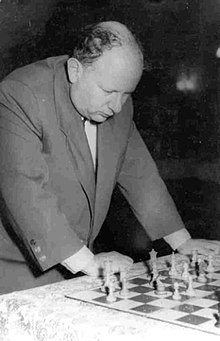Isaac Boleslavsky
| Isaac Boleslavsky | |
|---|---|
 | |
| Country | Soviet Union |
| Born | (1919-06-09)9 June 1919 Zolotonosha, Ukrainian SSR |
| Died | 15 February 1977(1977-02-15) (aged 57) Minsk, Byelorussian SSR, Soviet Union |
| Title | Grandmaster (1950) |
| Peak rating | 2560 (July 1971) |
Isaac Yefremovich Boleslavsky (Ukrainian: Ісаак Єфремович Болеславський, Russian: Исаак Ефремович Болеславский; 9 June 1919 – 15 February 1977) was a Soviet chess player and writer.
Early career
Born in Zolotonosha in Ukraine to Jewish parents,[1] Boleslavsky taught himself chess at age nine. In 1933, he became schoolboy champion of Dnipropetrovsk. Three years later, he won third prize in the 1936 USSR All-Union Junior Championship, held in Leningrad.
In 1938, at nineteen, Boleslavsky won the Ukrainian Championship; the following year, he won the Ukraine SSR championship, qualified to play in the USSR Chess Championship at the age of 20, and gained his national chess master title. He earned a degree in philology at Sverdlovsk University.
In 1940, Boleslavsky played in the 12th USSR championship final in Moscow. He won eight of his last ten games and tied for fifth-sixth place with Mikhail Botvinnik, but lost their personal meeting. Thereafter he sought revenge. Later, Boleslavsky as an ambitious 27-year-old master recalled the plans he had hatched:
I decided that by systematic work on myself I could win. "The devil is not so terrible as he is painted." Losses to Botvinnik in both games in a match tournament in 1941 and in our game in the XIV national championship four years later did not sober me. It seemed to me that I understood Botvinnik's game and saw its strengths and weaknesses. I began to prepare for a meeting with him. I understood, of course, it was a completely different style of player than my style in those years. But I thought I had a chance to win.
At the end of 1940 he won the Ukrainian Championship for the third consecutive year. In March 1941, he took part in the match-tournament for the title of Absolute Champion of the USSR, finishing fourth of six participants. On the eve of the match-tournament, he had to pass an examination at the University, and his preparation for the chess event proved to be inadequate.
In 1945 he took second place in the 14th USSR championship, behind Mikhail Botvinnik. He won nine games, drew six, and lost two. He was awarded the Grandmaster title in the USSR. He made his international debut on third board of the USSR–US radio match. He drew his first game with Reuben Fine and defeated him in the second game, winning a prize for the best game of the match.[2] Boleslavsky secured a clear advantage in the opening thanks to his superior pawn structure and won without allowing Fine much counterplay. The Soviets regarded Fine as possibly the strongest American player, based on his international results in the pre-World War II era.
In 1946, his daughter Tatiana was born; she later married David Bronstein. Boleslavsky and Bronstein had become friends in the late 1930s, and remained so throughout their lives. In 1946, Boleslavsky played abroad in an international tournament for the first time in Groningen and tied for sixth-seventh place.
In 1950 Boleslavsky was one of the inaugural recipients of the International Grandmaster title from FIDE.
World Championship Candidate
In the 1951 World Championship cycle, Boleslavsky qualified from the first-ever Interzonal at Saltsjöbaden 1948 into the Candidates Tournament two years later in Budapest. In the Candidates tournament—the winner of which would play a World Chess Championship match against Mikhail Botvinnik—he was the only undefeated player, and led for most of the tournament, but in the last round he was caught by Bronstein, who later won a playoff in Moscow that same year (+3−2=9).
This turned out to be Boleslavsky's last chance as a serious contender for the world championship. In 1953, he participated in the Candidates' tournament in Zürich, but finished in 10th–11th places, and never qualified for subsequent world championship cycles.
Later career
In 1951, Boleslavsky was Bronstein's second during his match with Botvinnik for the world championship, which wound up drawn after 24 games. In 1952, he scored 7 out of 8 at the Helsinki Olympiad, helping the Soviet team to the gold medals. This was the only Olympiad he would play in his career, but he attended several others to provide support for the Soviet team.
In 1951 Boleslavsky moved to Minsk and that same year became the champion of this city (he repeated his victory in 1953/54).[3] He won the Belarusian Championship in 1952 (joint) and 1964.
In 1961, he played in his last USSR Championship final. He took first place at an international tournament in Debrecen. He was world champion Tigran Petrosian's assistant from 1963 to 1969.
In 1968 he captained the USSR students' team, which won the World Championship at Ybbs an der Donau. His last tournament appearance was in Minsk in 1971, at age 52. Boleslavsky was the chief trainer of the USSR Chess Federation in the 1960s, and he remained until his death a very well respected analyst and chess writer, particularly in opening theory.
He died in Minsk on February 15, 1977, at the age of 57, after falling on an icy sidewalk, fracturing his hip and contracting a fatal infection while in hospital.














